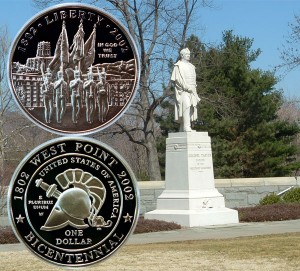Today, the West Point Commemorative Silver Dollar Coin remembers the “Father” of the military academy and the beginning of his tenure 198 years ago.
On July 28, 1817, Captain and Brevet Major Sylvanus Thayer replaced Captain Alden Partridge as the Superintendent of the United States Military Academy at West Point, New York.
The Centennial of the United States Military Academy printed by the Government Printing Office in 1904 described the facility prior to Thayer’s arrival:
=====
During the period from 1812 to July 28, 1817, when Capt. and Bvt. Maj. Sylvanus Thayer was appointed Superintendent, the course of instruction prescribed by Regulations was practically ignored, except infantry and artillery drills, which were the Acting Superintendent’s delight, and were well taught by him in person, but were necessarily limited, owing to the small number of Cadets to exercise and the few pieces of ordnance for drill and target practice.
There was no officer designated specially as instructor of tactics prior to 1818. The Acting Superintendent from 1814 to 1817 was commander, professor (teaching all branches then taught), and, when need be, chaplain.
The recorded history of this department may be considered, properly speaking, to date from the time that Bvt. Major and Captain Sylvanus Thayer assumed command and the superintendency of the Military Academy. He at once organized the Cadets into a battalion of two companies, officered by members of their own body, with a colonel at its head and an adjutant and a sergeant-major for his staff, and appointed an officer of the Army to command the battalion, as instructor of infantry tactics and in soldierly discipline, who was responsible for the interior police and administration.
=====
Similarly, in his book, Biographical Register of the Officers and Graduates of the U.S. Military published in 1891, George W. Cullen provided a description of the two men’s styles:
=====
” Old Pewter,” as Partridge was familiarly called by the cadets, who entertained for him a kind regard, though not a profound respect, was temperate, industrious, exacting, energetic, in his plodding way doing the best he could; but living the ascetic life of a recluse, and knowing little of the world beyond West Point, he continually moved, clad in his antiquated uniform, in the same unvarying treadmill of routine.
Like Bottom in the play, he was ready to perform all parts, whether of exercising command, filling a professor’s chair, supplying the pulpit, drilling a squad or battalion, lecturing on grand tactics or moral philosophy, inspecting mess kitchens or barracks, wrangling with bombardier soldiers, or descending to play police spy upon cadets.
He seemed to ignore all division of labor; and, zealous to supervise every detail, completely lost sight of the enlarged functions of his high office.
That he was incapable of directing a great institution of learning was not only then evident, but was subsequently proved by the entire failure of his many private military schools.
Worse than all, some years after leaving the Army, in a vituperative document addressed to Congress, the President, and the country, under the signature of Americas, he malignantly aspersed the motives and characters of honorable men, and raised his hand to destroy, if possible, the institution from which he had been graduated, and over which he had had the distinguished honor of presiding.
The officer relieved, and his successor in command of the Military Academy, were the very antipodes of each other, and both stamped the institution with their respective characters.
Partridge was ungainly in person and uncouth in manner, Thayer of heroic mould and of stately dignity; the one a martinet drill-master and contracted pedant, the other a scientific soldier and erudite scholar; the former partial and severe by turns, the latter uniform and just in discipline; the one controlling by temporary expedients, the other administering authority with enlightened wisdom; the former everywhere present and general factotum, the latter an unseen governor steadily regulating a complex machine; and while the one with restless activity accomplished little, the other, buried in his study, worked out with cool composure the great problem of military education.
The change from darkness to sunlight at West Point was magical.
The Academy, which had nodded through several years of comparative stagnation, was suddenly metamorphosed from a drowsy school of supine students to the precocious nonage of a great seminary of science and military art.
The wand of the new Carnot waved over all, educing strength and symmetry from atony and chaos. With heart, soul, and resolution, giving himself no rest, and utilizing all within his control, he boldly and undismayed entered upon his Augean labors of educational reformation.
With good habits and vigorous health, he was able to endure excessive exertion; an ardent nature intensified his zeal in the performance of duty; system and study taught him what to do, and how to do it; his iron will overcame all opposition, and brooked nothing not tributary to his success; and a vaulting ambition overleaped all impediments in the path to his purpose, which was to create a military educational institution worthy of a great people, and unsurpassed in the nations of the Old World.
=====
The West Point Commemorative Silver Dollar Coin shows beside an image of a statue and memorial to Sylvanus Thayer.
